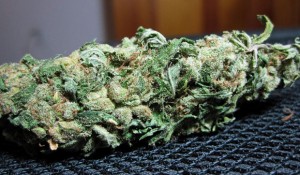
Vancouver has approved new rules to license and regulate illegal marijuana stores, making it the first city in Canada to attempt to control the burgeoning market – and setting it on a collision course with the country’s federal government.
After four days of public hearings, the city council approved regulations that will set zoning controls and hefty licence fees for Vancouver’s many pot shops: the city of 600,000 is thought to have more marijuana stores than its 109 Starbucks locations.
Neon green cannabis leafs have sprouted in shop windows across the city, and many shops employ in-house “naturopaths” available for quasi-medical consultations.
Addressing council before the vote, Meggs said he believes Vancouver’s approach will make a difference across the country.
“I think it’s going to be a significant decision. I think it will have widespread impact.”
Many Canadians – including the federal Liberal Party leader Justin Trudeau, local police departments and health authorities – have argued that the time has come to legalize, control and tax marijuana. The sticking point remains the federal government, who are the only authority with the power to legalize pot, and who remain fervently pro-prohibition.
Ambrose released a statement shortly after the Vancouver vote, restating the government’s position.
“Storefronts selling marijuana are illegal, and under this Conservative Government will remain illegal,” the statement said.
As Canada gears up for the October federal election, she also took time to take a political pot shot at Trudeau.
“These stores have absolutely no regard for the rule of law and have been caught selling marijuana to kids – they represent Justin Trudeau’s vision for Canadian neighbourhoods from coast to coast to coast,” Ambrose wrote.
Former British Columbia attorney-general Geoff Plant QC expressed support for regulation: “The federal government is increasingly out of touch. They are stuck in a ‘reefer madness’, non-evidence-based position.”
“The government of Canada has – with its failure to grasp the reality of marijuana and grapple with it – actually made things worse,” he argues. “They have allowed a black market to flourish, and now a white market has taken hold, and the longer it goes on, the harder it is to bring it back to a clean slate and introduce proper policy.”
In an attempt to sidestep a potential legal challenge from Ottawa, Vancouver has been careful to say they are simply regulating the businesses involved, not the products they are selling.
Under the new rules, dispensaries will be banned from operating within 300 metres of a school, community centre, or rival pot shop. They will also be obliged to pay a business license fee of $30,000, compared to a regular business license of just $250.
Over the period of public consultation, more than 200 people put their views forward in person or by email to council. City manager Penny Ballem said that the most striking submissions came from people working so-called “compassion clubs”, where medical marijuana is provided for sufferers of cancer and other illnesses.
Following those presentations, the proposed business license fee for that model was dropped to $1000.
“It was very compelling to hear how they provide access at an affordable rate to the most severely disabled and in need,” Ballem, a physician by training, notes.
“They are a different category to those simply retailing marijuana.”
Ballem said she believes interest in the marijuana market has boomed as a reaction to the legalization of pot in nearby Washington and Oregon states.
“They see a change in Canada as imminent, and they want to get in on it and get ahead of the game.”
